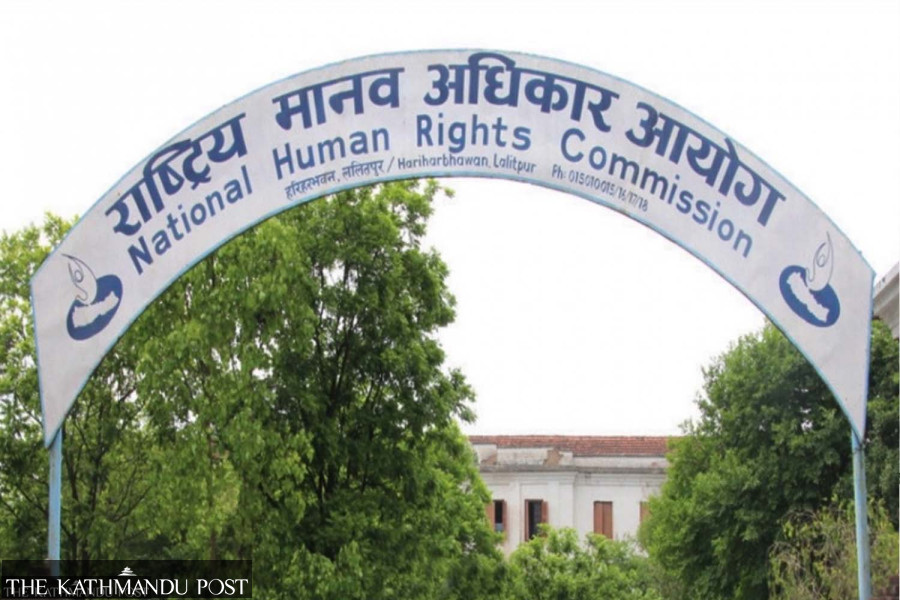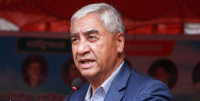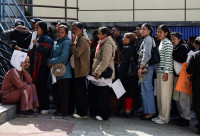National
Government ‘boycotts’ human rights commission’s anniversary celebration
PM’s secretariat says Oli was not ready for the morning event. NHRC doesn’t buy the logic.
Binod Ghimire
The National Human Rights Commission of Nepal (NHRC) had invited Prime Minister KP Sharma Oli as a chief guest for its silver jubilee celebrations, scheduled for Tuesday, with the invitation extended two weeks in advance.
Everything was in place until Monday evening—until a statement by the commission changed the course of events. Hours before the event, Oli's secretariat informed the commission that he was too busy to attend the programme.
Officials at the commission don’t buy that reason. “Prime ministers have been absent from our annual events even in the past but they would send their representatives. This time, there was no representation from the government,” said a senior official at the commission. “The absence, it seems, was a result of our statement from Monday and another related to transitional justice last week.”
Addressing a party function on Sunday, Oli had asked his party members to have the capital city ‘under their control’ on May 29, the day pro-monarchy forces have also planned a mass demonstration. Taking a serious exception to the remarks, the commission, through a statement, said such expressions violate the principles of the rule of law and democratic freedoms.
“In a democratic country, no political party has the right to claim control over any area. Such statements undermine the rule of law and encourage a culture of prohibition,” read the statement, urging Oli and other responsible individuals to exercise restraint in their public statements and refrain from inflammatory remarks.
On May 22, the commission had asked the newly appointed teams in the Truth and Reconciliation Commission and the Commission of Investigation on Enforced Disappeared Persons to ensure they don’t fail this time like in the past. It had asked both commissions to take the conflict victims into confidence in the process.
The commission has taken Oli’s absence as the government’s lack of commitment towards human rights.
“The prime minister was supposed to attend this event but he didn’t,” said Lily Thapa, a commission member, while addressing the event. “This is a testimony to how indifferent the government is to human rights.”
Oli’s aides, however, rubbish the claim that his absence was triggered by the commission’s statement. “He was busy until late Monday night. Therefore, it was not possible to attend the commission’s programme on Tuesday morning,” Ram Sharan Bajgain, Oli’s media expert, told the Post. “The prime minister cannot make it to every event.”
The commission says successive governments have been reluctant to implement its recommendations and now they have also started keeping away from formal programmes. Ever since its formation in 2000, the rate of full implementation of the commission’s recommendations is hardly 15 percent.
“Implementation of our recommendations is extremely poor. We could take steps to blacklist the agencies and officials who refuse to implement the commission’s recommendations, using our constitutional authority,” said Thapa, asking the government to be responsible towards the commission’s recommendations.
While the rate of implementation of the commission’s recommendations has been historically low, it has only gotten worse of late. Except for some departmental actions against perpetrators, the government has not implemented a single recommendation for compensation or legal action in the past four years.
As per the commission’s records, it has made 444 recommendations for interim relief, compensation and departmental actions against perpetrators as well as criminal prosecutions since the current team of office bearers took the commission’s command. Led by Chief Commissioner Top Bahadur Magar, the five-member team joined the commission in February 2021.
Following the commission’s pressure, a team led by Rajendra Thapa, joint-secretary at the Prime Minister’s Office, was constituted to facilitate the implementation. “The team did nothing more than documentation. There has been no progress in implementing the recommendations,” Shyam Babu Kafle, deputy spokesperson for the commission, told the Post.




 22.17°C Kathmandu
22.17°C Kathmandu














